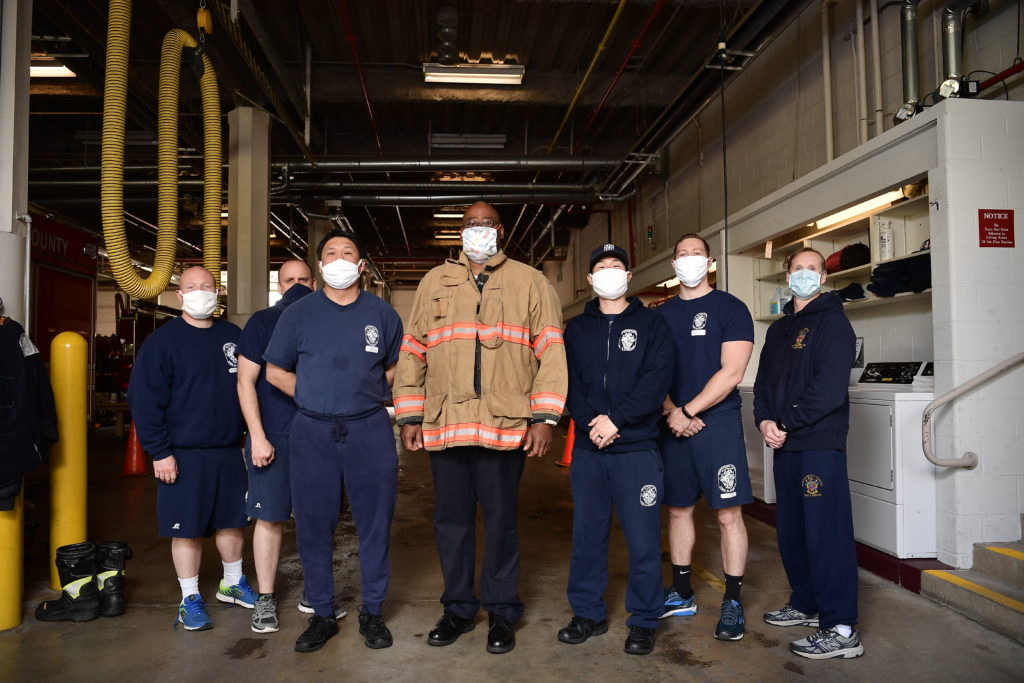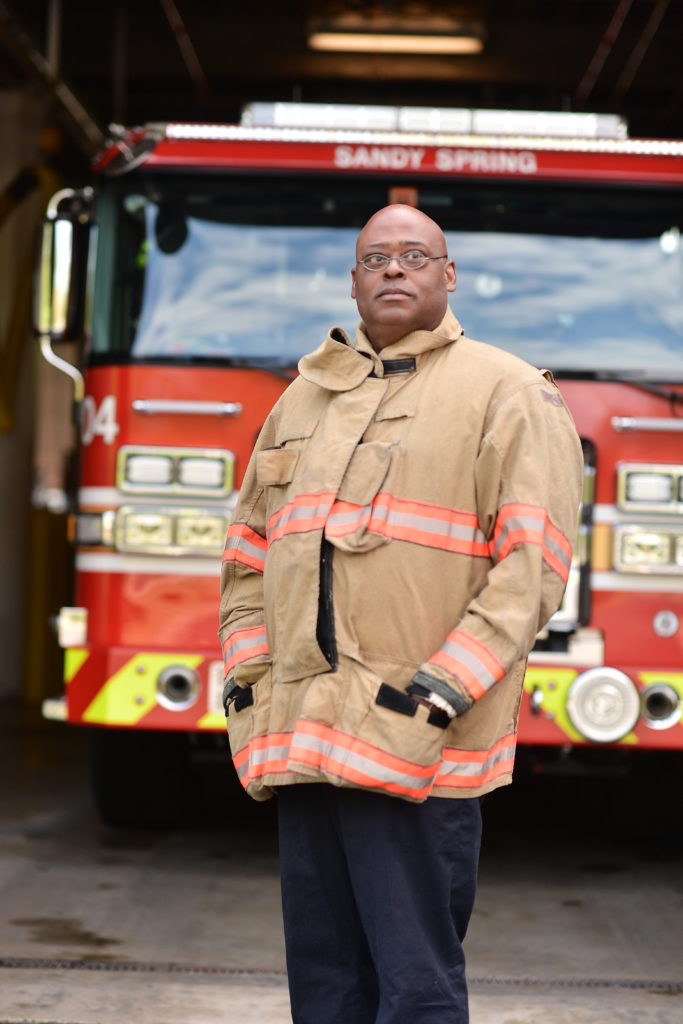
During the coronavirus pandemic, Montgomery County’s efforts to control the outbreak have been led by the Public Health Department and the Office of Emergency Management and Homeland Security. Another key player is a 30-year firefighting veteran who studies complexity theory, reads military strategists such as Gen. Carl von Clausewitz and finds hazmat situations intellectually “invigorating.”
Charles William Bailey, 49, is assistant chief in the Montgomery County Fire and Rescue Service and currently directs the division of human resources. Bailey grew up in Silver Spring, attended Montgomery Blair High School and graduated in December 1994 from the University of Maryland with a degree in art history. If that sounds like an unusual major for a would-be firefighter, it is also a clue as to the intellectual curiosity of a fellow who likes to quote author Kurt Vonnegut and Gen. George S. Patton.
Bailey wrote for the student newspaper in college and, as a firefighter, published his “musings,” as he calls them, on the website Tin Helmet. He gave that up for a while then started writing for a couple of blogs.
“At the end of the day,” he says, “what you know is pretty useless unless someone else can make use of it. The industry-specific textbooks will only take you so far. What firefighters need now is a diversity of information that will enhance their thought processes.”
I spoke with Chief Bailey by phone from his home in Hagerstown, where he lives with his wife, Lisa, and son, David.
Montgomery Magazine: Your degree from the University of Maryland is in art history. How does this connect with your career in firefighting?
Chief Bailey: The only thing I ever wanted to be was a paramedic. I went to college because I had to—it was a family requirement. My father thought education was a gateway to success. What I was looking for was a way to get a degree without any more math. I asked the guidance counselor which one of these majors would get me out of here fastest so I can focus on my career. The answer was art history.
MM: Why a paramedic?
CB: There was a TV show in the 1970s called “Emergency!” and I thought it was super cool. So I volunteered at the Sandy Springs department as a paramedic. But then I saw these big red, shiny fire trucks.
MM: Did your college prep help?
CB: That humanities degree has served me well in my profession, providing me with a framework for critical thinking on stuff when there isn’t a lot of certainty around. With coronavirus, we have a disease we don’t know lot about, we have to do a lot of translation between the scientists and the practitioners and we have to translate that into critical thinking.
MM: Can you compare this crisis with similar events in the county?
CB: Anthrax (in 2001) was a big thing for a couple of weeks. Ebola (in 2014) was a big thing for a while. But neither created these societal shifts—no stay-at-home orders, no toilet paper shortages. This pandemic has really shifted the fabric of society.
MM: Describe your action timeline during COVID-19.
CB: In January, when I saw what was happening in China, I suspected there would be an impact here. By early February, I realized this was going to be more trouble than I first thought. So Fire Rescue put together a task force to learn as much as possible about the virus. We had someone from Public Health and members of Emergency Services.
The real stuff began happening at the end of February. We met with the county’s director of emergency management, Earl Stoddard, and with Public Health. An incident management team was created to look at what was needed. I was the head for Fire Rescue and my role is coordinating the effort with other agencies.
MM: What was the early going like from a management view?
CB: March and April were really difficult in terms of understanding what was going on. There was a lot of learning in a short time. We were making moderate progress in coping with the caseload until about April 25. After that, our system seemed to stabilize.
MM: What tools did you use to manage the crisis?
CB: Most of the division chiefs had been reading (Retired Gen.) Stanley McChrystal’s “Team of Teams,” so we were discussing how to apply and leverage some of those concepts to our work. We also read “Call Sign Chaos” by Gen. James Mattis.
One of the smartest things we did was send one of our battalion chiefs, Capt. Amy Vanderryn, to be with the Public Health. By having a set of eyes and ears embedded in Public Health, she was able to keep us abreast of their thinking, ask questions and promote the needs of the fire department to them.
MM: How would you assess the results of your strategy?
CB: In the beginning we did not follow rigid protocols; we talked to whoever we had in our Rolodexes rather than observe hierarchical structures. As things began to stabilize, we slowly became more traditional in terms of producing incident action plans. A situation like this forces you to be able to turn on a dime.
It’s hard to talk about success while we’re still in it, but what has made us successful thus far is the established relationship with other agencies and individuals, which enabled us to get important information.
MM: How would you rate the civilian response? Anything we could have done better?
CB: What I’ve seen is selflessness, a willingness to jump in and help and an innate resilience. I think most Montgomery County residents think we are acting in their best interests. In general, I’d say people have been doing the right thing even though this has been a painful experience to go through.

MM: You have been in the forefront of rethinking firefighting methodology. Tell us about that.
CB: The true impact has come from Underwriters Laboratories Firefighters Safety Research Institute. We are rethinking how we define risk. When we went to a fire we never thought about hazardous materials; the fire was a hazard but we weren’t hyper focused on hazardous materials and contaminants. Firefighter contamination and decontamination fits into the overall goal of systemic risk reduction.
MM: You’ve also been rethinking the human factor, I understand.
CB: The fire was the secondary thing. The primary mission was to ensure the continued survivability of anyone in that structure. The exterior application of water to a burning structure does not have an adverse impact on the survivability of anyone inside—this is contrary to what was believed when I came into the fire department 30 years ago.
MM: You’ve learned a lot working with the hazmat team as well.
CB: I led the hazmat team for a number of years but I’ve been promoted out of that role. Being able to evaluate how these materials interact is just mentally invigorating. Here’s an example: About 10 years ago, a trash collector shows up at a local hospital, not feeling well. Soon, some doctors and nurses are not feeling well. It turned out that on his route, the collector had picked up some pesticides that had been thrown in the regular trash. His truck squished the stuff and atomized organophosphates in the pesticides, which are sometimes used in nerve agents. We had to figure out how best to treat this person and find and treat anyone he’d been in contact with.
MM: How do you spend whatever free time you might have?
CB: Mostly with books, and trying to understand music theory. I think it’s a flaw in my neural pathways that whether I’m in church or listening to a TED Talk about jazz, I always find a way to tie that back to disaster management or emergency services. A fire has a natural rhythm, and one of the worst things you can do as an incident commander is to disrupt the organic rhythm and try to impose your own.
So, with COVID-19, we’re operating at the boundaries of our knowledge and our capabilities. We try to amplify the things that are working—and dampen those that are not.
This story originally appeared in the June-July issue of Montgomery Magazine.




